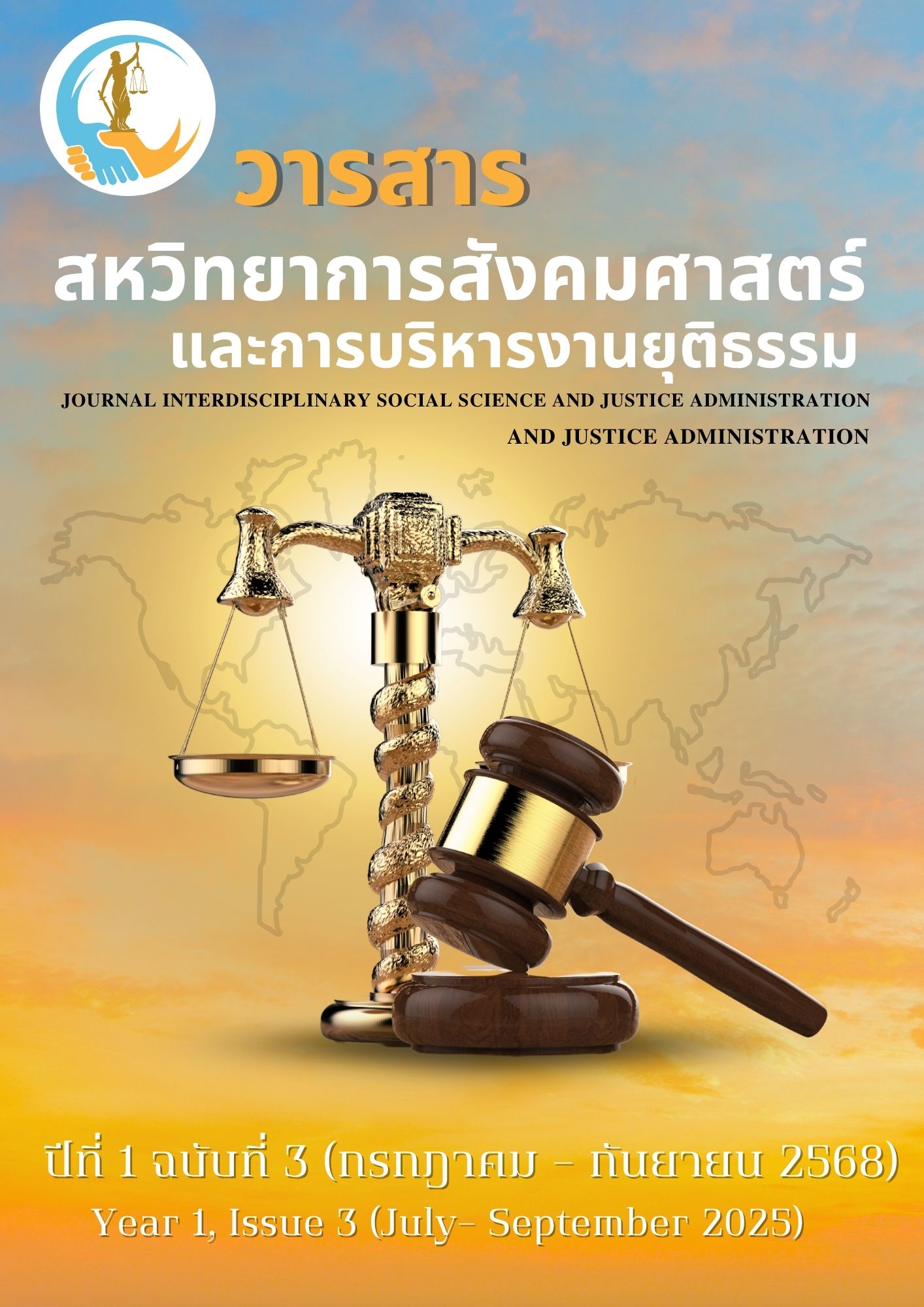กระบวนการยุติธรรมในยุคดิจิทัล
Main Article Content
บทคัดย่อ
เทคโนโลยีกำลังเปลี่ยนโลกของกระบวนการยุติธรรม จึงมีความจำเป็นที่กระบวนการยุติธรรมที่ต้องปรับตัวเพื่อตอบสนองกับความเปลี่ยนแปลงของโลก เราจึงต้องเข้าใจและมองไปข้างหน้าเพื่อทำให้กระบวนการยุติธรรรมปรับเปลี่ยนไปให้ทันความเปลี่ยนแปลงของโลก เทคโนโลยีอาจจะเข้ามาแทนระบบการทำงานเกือบทุกอย่าง ส่งผลให้เกิดความท้าทายที่จะต้องทำงานในกระบวนการยุติธรรมผ่านระบบเทคโนโลยีดิจิทัลทั้งหมด ด้วยเหตุนี้กระบวนการยุติธรรมในยุคดิจิทัลจึงเป็นประเด็นสำคัญที่สะท้อนการเปลี่ยนแปลงเชิงโครงสร้างของระบบกฎหมายและสังคม เนื่องจากเทคโนโลยีดิจิทัลเข้ามามีบทบาทในการบริหารงานยุติธรรมทุกระดับ ตั้งแต่การเข้าถึงข้อมูลกฎหมาย การดำเนินคดีผ่านระบบอิเล็กทรอนิกส์ไปจนถึงการใช้ปัญญาประดิษฐ์ในการวิเคราะห์คดี ความเปลี่ยนแปลงดังกล่าวช่วยเพิ่มประสิทธิภาพ ความโปร่งใส และการเข้าถึงสิทธิของประชาชน
ดังนั้น บทความนี้จึงมีวัตถุประสงค์เพื่อวิเคราะห์แนวทางการในปรับตัวของกระบวนการยุติธรรมโดยศึกษาจากบริบทของต่างประเทศ ซึ่งได้กำหนดกรอบการใช้เทคโนโลยีดิจิทัลในการพิจารณาคดีและ การบริหารงานยุติธรรม เพื่อนำมาประยุกต์ใช้กับระบบยุติธรรมไทย โดยมุ่งเน้นการสร้างสมดุลระหว่างประสิทธิภาพ ความโปร่งใส และการคุ้มครองสิทธิของประชาชน และสามารถก้าวทันต่อการเปลี่ยนแปลงทางเทคโนโลยี
Article Details

อนุญาตภายใต้เงื่อนไข Creative Commons Attribution-NonCommercial-NoDerivatives 4.0 International License.
บทความนี้ได้รับการเผยแพร่ภายใต้สัญญาอนุญาต Creative Commons Attribution-NonCommercial-NoDerivatives 4.0 International (CC BY-NC-ND 4.0) ซึ่งอนุญาตให้ผู้อื่นสามารถแชร์บทความได้โดยให้เครดิตผู้เขียนและห้ามนำไปใช้เพื่อการค้าหรือดัดแปลง หากต้องการใช้งานซ้ำในลักษณะอื่น ๆ หรือการเผยแพร่ซ้ำ จำเป็นต้องได้รับอนุญาตจากวารสารเอกสารอ้างอิง
กฎหมาย 4.0. (2562). ระบบศาลอิเล็กทรอนิกส์ในศาลยุติธรรมไทย. สืบค้นเมื่อ 25 สิงหาคม 2568, จาก https://www.Bangkokbiznews.com/blogs/columnist/123266
จิตแข เทพชาตรี. (2563). New Normal ไลฟ์สไตล์ใหม่ บนโลกใบเดิม. สืบค้นเมื่อ 23 สิงหาคม 2568, จาก https://www.samitivejhospitals.com/th/article/detail/new-normal-%E0%B8% AA%E0%B8%B8%E0%B8%82%E0%B8%A0%E0%B8%B2%E0%B8%9E
ธนภัทร ชาตินักรบ. (2558). เพิ่มประสิทธิภาพกระบวนการศาลไทย ด้วย e-Court. สืบค้นเมื่อ 24 สิงหาคม 2568, จาก https://tdri.or.th/2015/11/e-court-20151119/
นัฐกานต์ ขำยัง. (2568). บทบาทและความรับผิดของ AI ในกระบวนการยุติธรรม กรณีศึกษาสาธารณรัฐประชาชนจีน. ฝ่ายวิเคราะห์และคดีปกครอง กองกฎหมายปกครอง สำนักงานคณะกรรมการกฤษฎีกา.
พิภพ อุดร. (ม.ป.ป.). กระบวนการยุติธรรมยุคดิจิตอล: เทคโนโลยีกับการสร้างความเสมอภาค และประสิทธิภาพในกระบวนการยุติธรรม สืบค้นเมื่อ 25 สิงหาคม 2568, จาก file:///C:/Users/ Acer/Downloads/3.pdf
เมตตา มงคลธีระเดช. (2567). ทฤษฎีการเรียนรู้ทางสังคม (Social Learning Theory) ของอัลเบิร์ต แบนดูร่า. สืบค้นเมื่อ 25 สิงหาคม 2568, จาก https://li.kmutt.ac.th/social-learning-theory/ knowledge/
สถาบันพระปกเกล้า. (2553). กระบวนการยุติธรรม. สืบค้นเมื่อ 23 สิงหาคม 2568, จาก https://wiki. kpi.ac.th/index.php?title=%E0%B8%81%E0%B8%A3%E0%B8%B0%E0%B8%9A%E0 %B8%A7%E0%B8%99%E0%B8%81%E0%B8%B2%E0%B8%A3%E0%B8%A2%E0%B8%B8%E0%B8%95%E0%B8%B4%E0%B8%98%E0%B8%A3%E0%B8%A3%E0%B8%A1
สำนักกฎหมายและวิชาการศาลยุติธรรม. (ม.ป.ป.). โครงการเผยแพร่ความรู้ระบบศาลอิเล็กทรอนิกส์ (e-court). สืบค้นเมื่อ 25 สิงหาคม 2568, จาก https://jla.coj.go.th/th/content/category/de tail/id/8/cid/5787/iid/93118
สำนักงานกิจการยุติธรรม. (2564). กระบวนการยุติธรรมในเศรษฐกิจยุคดิจิทัล. สืบค้นเมื่อ 24 สิงหาคม 2568, จาก https://justicechannel.org/watch/sym18-2
DGA Thailand. (2565). Digital Transformation ก้าวสำคัญของการเปลี่ยนแปลงสู่โลกดิจิทัล. สืบค้นเมื่อ 23 สิงหาคม 2568, จาก https://standard.dga.or.th/article/3862/
INTERPOL. (n.d.). Digital forensics. Retrieved August 24, 2025, from https://www.interpol. int/How-we-work/Innovation/Digital-forensics
Iryna Mahalias. (2024). AI adoption in criminal justice – How can industry support the justice system in implementing Artificial Intelligence. Retrieved August 24, 2025, from https://www.techuk.org/resource/ai-adoption-in-criminal-justice-how-can-industry-support-the-justice-system-in-implementing-artificial-intelligence.html
Key Takeaways From a Convening of Leading Stakeholders. Retrieved August 25, 2025, from https://counciloncj.org/the-implications-of-ai-for-criminal-justice/
The Council advances understanding of the criminal justice policy choices facing the nation and builds consensus for solutions that enhance safety and justice for all. (2567). The Implications of AI for Criminal Justice


